First Draft, First Brain
For the last year I have been busy revising Reston Peace and finally feel that I have solid manuscript to shop around. Revising is my favorite part of writing; it can be both exhilarating and exasperating, combing through the text, unknotting tangles in the language, determining which scenes are tight and which are simply redundant. This is where the story truly takes shape, now that you have the whole in front of you, and you can figure out where there are gaps in the storytelling and where the characters burn with living passion.
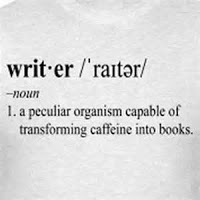 Coming down off the revising phase and turning to face a new project, I always am flummoxed by the prospect of beginning a first draft. I forget how it’s done. I know it’s a messy process, and it requires an uncensored brain, but for the last twelve months I have been training my brain in a different direction. Revising is more analytical, while writing a first draft is more experimental.
Coming down off the revising phase and turning to face a new project, I always am flummoxed by the prospect of beginning a first draft. I forget how it’s done. I know it’s a messy process, and it requires an uncensored brain, but for the last twelve months I have been training my brain in a different direction. Revising is more analytical, while writing a first draft is more experimental.
Every writer has her own approach to writing, and though writers can come up with some inspirational quote to get you motivated, the sad, unhappy truth is that no one else is going to write your first draft for you. It is not a communal project. You don’t have a cheering crowd behind you, and you don’t get a gold star at the end of the day. Maybe if there were some accolades along the way, it wouldn’t feel quite so lonely, but I doubt anyone else’s praises are going to motivate me more than my own inner drive to create.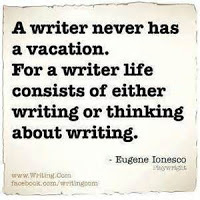 Writing a first draft is like splattering paint on a canvas. That’s one of two images that often come to mind. I imagine dipping a brush into oil paint, getting the tip so saturated that by the time I bring it up to the canvas, a trail of droplets have already sprayed across the surface. I dip the brush into another color, then another, adding to the mess, until I’m ready for a break, and I can step back to see what forms and shapes are usable, and what is simply extraneous. I keep doing this for days and weeks, until eventually I get into a groove, and the paint tends to go where it needs to and less dribbles outside the margins. Subsequent drafts are about cleaning up those edges.
Writing a first draft is like splattering paint on a canvas. That’s one of two images that often come to mind. I imagine dipping a brush into oil paint, getting the tip so saturated that by the time I bring it up to the canvas, a trail of droplets have already sprayed across the surface. I dip the brush into another color, then another, adding to the mess, until I’m ready for a break, and I can step back to see what forms and shapes are usable, and what is simply extraneous. I keep doing this for days and weeks, until eventually I get into a groove, and the paint tends to go where it needs to and less dribbles outside the margins. Subsequent drafts are about cleaning up those edges.
The other image is the blunderbuss. I load a bunch of vocabulary, punctuation, concepts, images, a ephemera into the muzzle and let it blast at the page, and again I see what hits closest to the target and which pieces fly too wide.
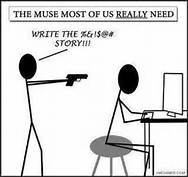 Every project ends up requiring a slightly different approach. While there are certain things I always do, I do have to figure out what this draft specifically needs. Sometimes it takes pages and pages of writing to discover the narrator’s voice, even if it is a third-person narrator. Sometimes it takes careful planning of every last detail and loads of outlining before I can begin. Sometimes I simply have an image in my head and start there to see where it will lead. Always a story idea percolates for a very long time before I begin to write.
Every project ends up requiring a slightly different approach. While there are certain things I always do, I do have to figure out what this draft specifically needs. Sometimes it takes pages and pages of writing to discover the narrator’s voice, even if it is a third-person narrator. Sometimes it takes careful planning of every last detail and loads of outlining before I can begin. Sometimes I simply have an image in my head and start there to see where it will lead. Always a story idea percolates for a very long time before I begin to write.
For Dead Hungry, I had lots of scenarios but figuring out how they fitted together took some work. But it was always clear to me that the book would start with Freddie ranting about a really bad horror movie. I could see him hopping about in the traffic outside the movie theater like some latter-day Kevin McCarthy warning people that “They’re here, they’re here, you’re next!”
For Reston Peace, I wrote a very angry first draft twenty years ago. It started with Kenny’s car breaking down and rolling onto some railroad tracks, and he has to push it to safety. Then he is forced to walk home, and he gets a rock in his shoe, and he walks for miles before he bothers to take it out (symbolic of putting up with the pain in his life).
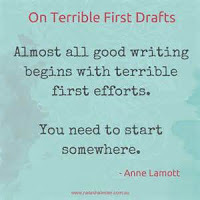 When I decided to rework the book, I decided to use a frame tale of Kenny as a forty-year-old looking back on the events of his younger self. It took a while to get his voice right because now he was no longer a twenty-year-old telling the story but someone with more insight. More than anything else, I had to reconsider the story I wanted to tell. The scenes from that original version eventually got whittled away until a completely new story took place. Overall, it still tells how Kenny deals with a history of sexual abuse, but the incidents are completely different.
When I decided to rework the book, I decided to use a frame tale of Kenny as a forty-year-old looking back on the events of his younger self. It took a while to get his voice right because now he was no longer a twenty-year-old telling the story but someone with more insight. More than anything else, I had to reconsider the story I wanted to tell. The scenes from that original version eventually got whittled away until a completely new story took place. Overall, it still tells how Kenny deals with a history of sexual abuse, but the incidents are completely different.
The one approach I always use is the quick review. I always reread what I wrote the day before and do a little tweaking of the language. I try not to get bogged down in revising or polishing, but rather I want to get back into the same frame of mind I was yesterday, but now I have a little more insight into what I’d written, and I can make it a smidge better, and that propels me into today’s writing. I also use word count goals for the day. It keeps me moving forward, even if every sentence seems like crap. Usually there is some nugget amidst the dross that is salvageable.
I’ve been working about a month on the first draft of a new novel, and yesterday was the first time I felt like I had made the shift back to first-draft mind. I didn’t care so much about the quality of the writing; I was more interested in the story I was telling. It was amazing how freeing it felt to reach this point, as though I had quieted the analytical revision-brain to tap into the more reptilian first-brain of creation. Let the lizard loose!
Okay, here’s an inspirational quote I can definitely get behind, from Stephen King:
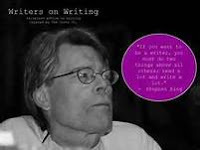 Tell it, Stephen!“Writing isn’t about making money, getting famous, getting paid, getting laid, or making friends. In the end it’s about enriching the lives of those who will read your work, and enriching your own life as well. It’s about getting up, getting well, and getting over. Getting happy, okay? Getting happy … this book … is a permission slip: you can, you should, and if you’re brave enough to start, you will. Writing is magic, so much the water of life as any other creative art. The water is free. So drink. Drink and be filled up.” (Stephen King, On Writing: A Memoir of the Draft)
Tell it, Stephen!“Writing isn’t about making money, getting famous, getting paid, getting laid, or making friends. In the end it’s about enriching the lives of those who will read your work, and enriching your own life as well. It’s about getting up, getting well, and getting over. Getting happy, okay? Getting happy … this book … is a permission slip: you can, you should, and if you’re brave enough to start, you will. Writing is magic, so much the water of life as any other creative art. The water is free. So drink. Drink and be filled up.” (Stephen King, On Writing: A Memoir of the Draft)
 Coming down off the revising phase and turning to face a new project, I always am flummoxed by the prospect of beginning a first draft. I forget how it’s done. I know it’s a messy process, and it requires an uncensored brain, but for the last twelve months I have been training my brain in a different direction. Revising is more analytical, while writing a first draft is more experimental.
Coming down off the revising phase and turning to face a new project, I always am flummoxed by the prospect of beginning a first draft. I forget how it’s done. I know it’s a messy process, and it requires an uncensored brain, but for the last twelve months I have been training my brain in a different direction. Revising is more analytical, while writing a first draft is more experimental.Every writer has her own approach to writing, and though writers can come up with some inspirational quote to get you motivated, the sad, unhappy truth is that no one else is going to write your first draft for you. It is not a communal project. You don’t have a cheering crowd behind you, and you don’t get a gold star at the end of the day. Maybe if there were some accolades along the way, it wouldn’t feel quite so lonely, but I doubt anyone else’s praises are going to motivate me more than my own inner drive to create.
 Writing a first draft is like splattering paint on a canvas. That’s one of two images that often come to mind. I imagine dipping a brush into oil paint, getting the tip so saturated that by the time I bring it up to the canvas, a trail of droplets have already sprayed across the surface. I dip the brush into another color, then another, adding to the mess, until I’m ready for a break, and I can step back to see what forms and shapes are usable, and what is simply extraneous. I keep doing this for days and weeks, until eventually I get into a groove, and the paint tends to go where it needs to and less dribbles outside the margins. Subsequent drafts are about cleaning up those edges.
Writing a first draft is like splattering paint on a canvas. That’s one of two images that often come to mind. I imagine dipping a brush into oil paint, getting the tip so saturated that by the time I bring it up to the canvas, a trail of droplets have already sprayed across the surface. I dip the brush into another color, then another, adding to the mess, until I’m ready for a break, and I can step back to see what forms and shapes are usable, and what is simply extraneous. I keep doing this for days and weeks, until eventually I get into a groove, and the paint tends to go where it needs to and less dribbles outside the margins. Subsequent drafts are about cleaning up those edges.The other image is the blunderbuss. I load a bunch of vocabulary, punctuation, concepts, images, a ephemera into the muzzle and let it blast at the page, and again I see what hits closest to the target and which pieces fly too wide.
 Every project ends up requiring a slightly different approach. While there are certain things I always do, I do have to figure out what this draft specifically needs. Sometimes it takes pages and pages of writing to discover the narrator’s voice, even if it is a third-person narrator. Sometimes it takes careful planning of every last detail and loads of outlining before I can begin. Sometimes I simply have an image in my head and start there to see where it will lead. Always a story idea percolates for a very long time before I begin to write.
Every project ends up requiring a slightly different approach. While there are certain things I always do, I do have to figure out what this draft specifically needs. Sometimes it takes pages and pages of writing to discover the narrator’s voice, even if it is a third-person narrator. Sometimes it takes careful planning of every last detail and loads of outlining before I can begin. Sometimes I simply have an image in my head and start there to see where it will lead. Always a story idea percolates for a very long time before I begin to write.For Dead Hungry, I had lots of scenarios but figuring out how they fitted together took some work. But it was always clear to me that the book would start with Freddie ranting about a really bad horror movie. I could see him hopping about in the traffic outside the movie theater like some latter-day Kevin McCarthy warning people that “They’re here, they’re here, you’re next!”
For Reston Peace, I wrote a very angry first draft twenty years ago. It started with Kenny’s car breaking down and rolling onto some railroad tracks, and he has to push it to safety. Then he is forced to walk home, and he gets a rock in his shoe, and he walks for miles before he bothers to take it out (symbolic of putting up with the pain in his life).
 When I decided to rework the book, I decided to use a frame tale of Kenny as a forty-year-old looking back on the events of his younger self. It took a while to get his voice right because now he was no longer a twenty-year-old telling the story but someone with more insight. More than anything else, I had to reconsider the story I wanted to tell. The scenes from that original version eventually got whittled away until a completely new story took place. Overall, it still tells how Kenny deals with a history of sexual abuse, but the incidents are completely different.
When I decided to rework the book, I decided to use a frame tale of Kenny as a forty-year-old looking back on the events of his younger self. It took a while to get his voice right because now he was no longer a twenty-year-old telling the story but someone with more insight. More than anything else, I had to reconsider the story I wanted to tell. The scenes from that original version eventually got whittled away until a completely new story took place. Overall, it still tells how Kenny deals with a history of sexual abuse, but the incidents are completely different.The one approach I always use is the quick review. I always reread what I wrote the day before and do a little tweaking of the language. I try not to get bogged down in revising or polishing, but rather I want to get back into the same frame of mind I was yesterday, but now I have a little more insight into what I’d written, and I can make it a smidge better, and that propels me into today’s writing. I also use word count goals for the day. It keeps me moving forward, even if every sentence seems like crap. Usually there is some nugget amidst the dross that is salvageable.
I’ve been working about a month on the first draft of a new novel, and yesterday was the first time I felt like I had made the shift back to first-draft mind. I didn’t care so much about the quality of the writing; I was more interested in the story I was telling. It was amazing how freeing it felt to reach this point, as though I had quieted the analytical revision-brain to tap into the more reptilian first-brain of creation. Let the lizard loose!
Okay, here’s an inspirational quote I can definitely get behind, from Stephen King:
 Tell it, Stephen!“Writing isn’t about making money, getting famous, getting paid, getting laid, or making friends. In the end it’s about enriching the lives of those who will read your work, and enriching your own life as well. It’s about getting up, getting well, and getting over. Getting happy, okay? Getting happy … this book … is a permission slip: you can, you should, and if you’re brave enough to start, you will. Writing is magic, so much the water of life as any other creative art. The water is free. So drink. Drink and be filled up.” (Stephen King, On Writing: A Memoir of the Draft)
Tell it, Stephen!“Writing isn’t about making money, getting famous, getting paid, getting laid, or making friends. In the end it’s about enriching the lives of those who will read your work, and enriching your own life as well. It’s about getting up, getting well, and getting over. Getting happy, okay? Getting happy … this book … is a permission slip: you can, you should, and if you’re brave enough to start, you will. Writing is magic, so much the water of life as any other creative art. The water is free. So drink. Drink and be filled up.” (Stephen King, On Writing: A Memoir of the Draft)
Published on December 30, 2015 07:15
No comments have been added yet.



